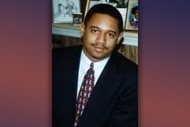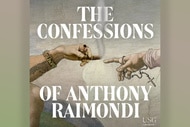John Stamos' Launches Podcast On Frank Sinatra Jr. Kidnapping, But Does It Tell The Whole Story?
The podcast from former "Full House" star John Stamos gives Barry Keenan free rein to tell his story of kidnapping Frank Sinatra Jr. in 1963.

Beloved Hollywood actor John Stamos' introductory efforts at a true crime podcast looks at the man behind the kidnapping of Frank Sinatra, Jr. in 1963 — but isn't quite everything it could be.
In the introduction to "The Grand Scheme: Snatching Sinatra," which premiered on July 27, Stamos promised to bring listeners "one of the greatest untold stories ever": that of "my friend, Barry Keenan" who, in 1963, masterminded a plot to kidnap Frank Sinatra, Jr. from his hotel in Lake Tahoe, Nevada and ransom him to his father for $240,000 (or about $2.1 million in 2021 terms).
But Keenan's story is hardly "untold": he participated in its telling at length to the New Times Los Angeles in 1998, to People in 1998, on an episode "This American Life" in 2002 and in short to the BBC in 2014. The only way in which his version has been left untold is that, when Columbia Pictures attempted to acquire the rights to Keenan's New Times Los Angeles story for a movie (and to pay him for those rights), Keenan's victim, Sinatra, sued in 1998 under the Son of Sam law to keep him from profiting from his crime and won at trial and on appeal in 1999, but the California Supreme Court struck down the law in 2002 as a result of Keenan's case. (It's unclear if, after the ruling was reversed, Columbia ever actually paid Keenan.)
A Showtime version of the story, "Stealing Sinatra," ran on the network in 2003 — a title card reportedly read "no animals were harmed and no criminals profited in the making of this film" — and Deadline reports that an independent movie version is currently in development.
Stamos' podcast, like many of the previous versions of the retelling of the story, leans heavily on Keenan's version of events, making it feel rather credulous by modern standards of trauma-informed reporting.
But by Keenan's own version of events (as well as the FBI's history of the case), he and a former high school classmate abducted a blindfolded Sinatra Jr. at gunpoint from Lake Tahoe in the middle of a blizzard, threatened a shootout with the police if Sinatra revealed what he was going through when they were stopped, forced Sinatra Jr. to ingest drugs and alcohol to make him quiescent for the multi-hour drive to Los Angeles and threaten to kill him when he doesn't cooperate once they are there. They held him for nearly three days, telling him they were low-level players in a larger conspiracy run by more violent men who would kill him, supposedly made him participate in bonding rituals (likely triggering what's since become known as "Stockholm Syndrome" — which is not a recognized psychiatric diagnosis — but is more recently recognized as one way that traumatized captives attempt to build empathy with their captors in order to increase their chances of survival) and, eventually, one dropped him off at the side of the 405 and drove off.
Keenan and the other kidnappers then claimed at trial that the Sinatra family had engineered the whole thing as a publicity stunt. And, quite clearly, Keenan — unlike his co-conspirator Joe Amsler, who died in 2006 — has attempted to either profit off or garner publicity from his participation in the kidnapping for a significant period of time.
Keenan, of course, doesn't view the experience of the Sinatra kidnapping that way — and by centering the podcast entirely around his story, Stamos didn't give listeners a chance to truly think through what Keenan and his co-conspirators put someone else through, either. It's just "one of the greatest untold stories ever," even if the person really at the center of it never wanted to tell it again.
Nancy Sinatra, who attended Santa Monica High School with Keenan, refused to comment for the podcast. That's not strange in and of itself: The Sinatra family rarely commented on the kidnapping after the kidnappers' defense was that family had been involved (they were not) or their lawyers' demands that Sinatra, Jr. admit on the stand at trial that, while in the custody of his abductors, he told them "I hope you guys get away with this." (Keenan's continued insistence that he and Nancy were friends in high school — which she denies — probably also did not encourage her to comment.)
In 2012, Keenan's victim, Sinatra, Jr., told The Guardian that the stigma from his kidnappers' lie about his participation stuck to him despite its false nature, which would likely have deepened the traumatic nature of the experience.
While Keenan admits on the podcast that his thinking at the time of the kidnapping, including his lack of empathy for what he put Sinatra Jr. through and his justifications that the kidnapping would be good for Sinatra, was muddled by his untreated mental illness and his drug and alcohol abuse, he doesn't explain (and Stamos didn't ask) why he continued to force Sinatra Jr.'s traumatic experience back into the public consciousness when the Sinatras clearly had no interest in reliving or retelling it, or why he fought so hard to get the right to profit from his time as a kidnapper.
And while Stamos told People that he hoped one takeaway from the podcast would be the need for people with mental health problems like Keenan's to seek or get help seeking treatment, it's hard to see how that's the main takeaway from the story.
The podcast, however, is perhaps most effective as an unintentional look at how Keenan managed — despite being best known for kidnapping Frank Sinatra's son — to stay in the good graces of some in Hollywood.
After all, Stamos refers to Keenan as "a friend," and the entire series was filmed at Stamos' home. Stamos recounts early on how he and Keenan were introduced in the 1980s by none other than Dean Torrence of the 60s surf band Jan and Dean. Torrence, we learn in episode one, was a high school classmate of Keenan's.
In episode two, we discover that Keenan confided his kidnapping plan to Torrence in advance in an ultimately successful effort to extract money from him. But in 1998, Keenan told the New Times Los Angeles that Torrence had fronted him money during the kidnapping in order to help Keenan pay off his hotel bill in Tahoe. (Torrence said at the kidnapping trial and Keenan says in the podcast that Torrence gave him money after Keenan approached him in November 1963, not during the kidnapping in December.)
Torrence was actually the defense's key witness at the kidnapping trial, who they said had financed the plot on behalf of the Sinatra family. Torrence infamously reversed some of his testimony at the trial while acknowledging he'd known of Keenan's plot in advance and had given him the money, thinking it was to tide him over. (The episode about the trial is not yet widely available.) He was never charged in the case and, apparently, remains friends with Keenan.
Keenan, who served five years of his 75 years plus life in prison sentence after being declared mentally incompetent, remained in California part time after his release and became a successful real estate developer. He told People in 1998 that he'd run into his victim at cocktail parties but hadn't spoken to him; he told the BBC in 2014 that, after his release, he'd attempted to contact Frank Sinatra Jr. in an effort to meet to make amends but had been rebuffed.
Frank Sinatra Jr. died in 2016 at the age of 72


























